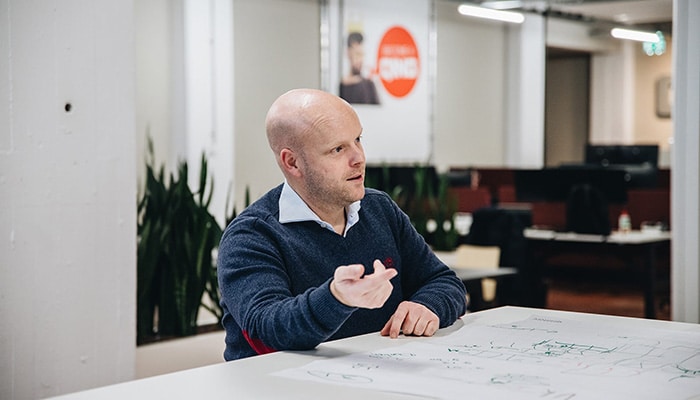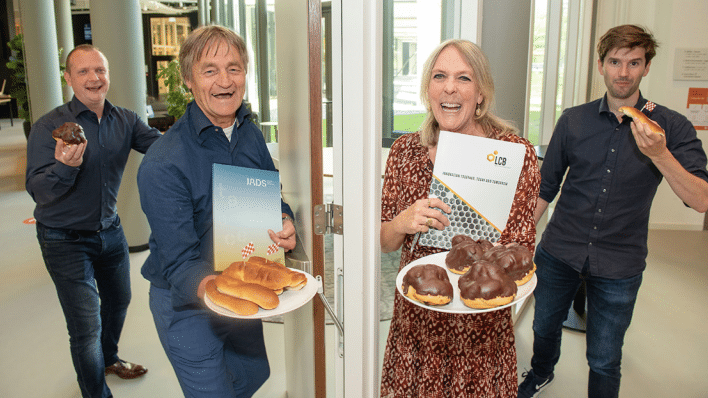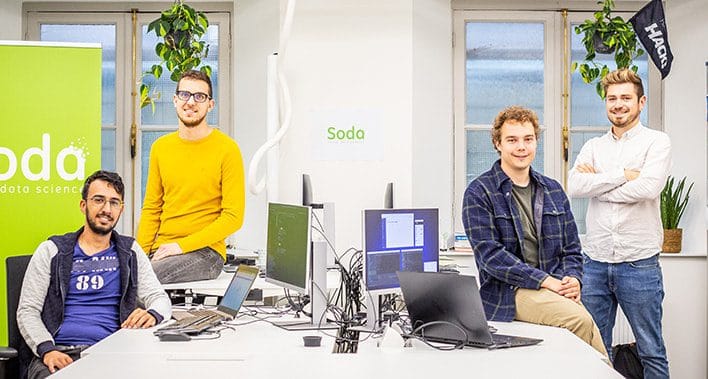JADS MKB Datalab celebrates its 100th project partner!
Posted on
JADS MKB Datalab recently notched up its 100th project partner, a huge milestone that is a testament to the success of the young organization’s model. Set up in 2018, MKB Datalab’s mission is to bridge the gap between the latest developments in data science and the needs and wishes of small and medium-sized businesses. While a digital transition can mean a big step forward for small businesses in particular, they often find it hard to extract maximum value from their own data.
During the past three years, MKB Datalab has assisted a huge range of businesses, for whom it has performed a wide variety of projects, from fairly simple to highly complex. While the number of partners now stands at 100, the actual number of projects performed is almost twice that number, given that many past partners have come back for more. For the master’s students at MKB Datalab, this is proof that every business can get more mileage out of data science.
“Every project we complete changes our partner’s mind-set,” explains Maaike Blok, one of the project managers at MKB Datalab. “The results really convince them that they need to adopt data-driven working practices. It’s also interesting to see that our current applicants are more advanced than their counterparts from three years ago. That’s good news, because it confirms a growing trend among businesses to adopt data-driven practices, which in turn shows that people are more aware of the importance of data science. Give us another three years and you’ll see that data science will have made massive advances. Our role is to help businesses prepare for that future and to sensitize them to the need to incorporate data science in their business models.”
QING
So who exactly is the 100th partner? It’s a firm of high-tech engineers called QING whose business focus lies on developing solutions regarding complex products such as vegetables and meat by applying state of the art technologies like AI and Simulation. Operations Manager Barry van Bakel explains:
“The market in which we operate involves a large number of manual processing activities that are theoretically capable of being automated. The problem is that there’s a huge lack of knowledge on data science. Although we’ve managed to open up the market, we’d like to have access to more data. We need to find out how other businesses work.”
Drawn by the word ‘academy’
“During our search for a partner to team up with, we came across JADS and were particularly drawn by the word ‘academy’. We liked the idea of a group of students taking a fresh look at the data. Most engineers tend to immediately think in terms of solutions based on preconceived biases. We were really excited by the prospect of talented young people bringing a new perspective with them.”
What did the project involve? Barry van Bakel: “We asked Valérie Bense, the student who was assigned to us, to work on a fictional case study that closely resembled one of our own contracts, which we weren’t able to disclose for confidentiality reasons. We weren’t expecting the project to generate an oven-ready product. Rather, the idea was to see it as a learning opportunity, a sort of playground – albeit comparable to a real-life situation.”
Like peeling shrimps
“The product Valérie worked on was rather like a machine for peeling shrimps. This is the holy grail of the food industry – a machine that everyone has spent years looking for, but which no one has managed to find. We had succeeded in producing a prototype that was capable of automating its production process to a certain degree. The aim of the project with MKB Datalab was to try and drive forward the automation process. Valérie came up with a model that allowed us to optimize the output by manipulating the production process. We were able to show that there was a huge amount we could do with the data generated by the machine.”
Voyage of discovery
Although the model clearly worked, the project threw up all sorts of questions that needed answering. “We met Valérie on a number of occasions to evaluate the progress made to date,” explains Van Bakel, “and each of these meetings produced new questions. It really was a voyage of discovery. Which was exactly what we wanted: an exploratory study with a fresh pair of eyes.”
For Valérie herself, the project proved to be very much a learning process: “It really made clear to me that you can’t approach every problem from an academic perspective. In some cases, there are just too many moving parts to deal with and in other cases, you end up overcomplicating things. What you then need to do is to take a step back, try and think logically and adopt a pragmatic approach. In the end, you get a lot further than if you blindly follow an academic theory.”
Short turnaround time
What’s the big advantage of working with MKB Datalab? “The opportunity to work with specialists and exchange knowledge and experience.” replies Van Bakel. “Also, the easy, low-cost approach. You agree at the outset on the duration of the project, and you know in advance exactly what it’s going to involve. That’s much more difficult if you’re working with a firm charging consultancy fees. MKB Datalab is ideal for tackling a relatively small data science problem or for getting the feel of a particular issue.”
More information
Want to know more about the JADS MKB Datalab? Check out their website and example cases.



